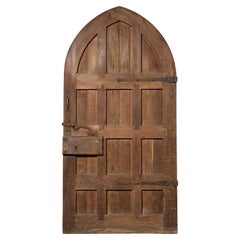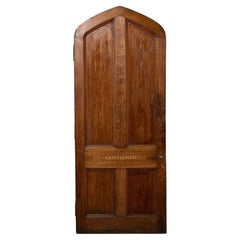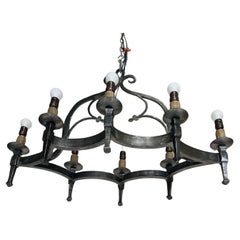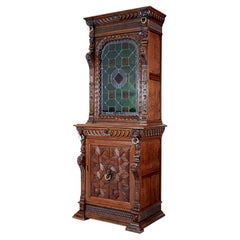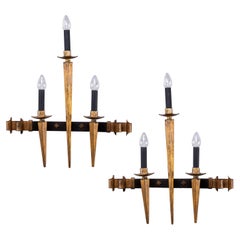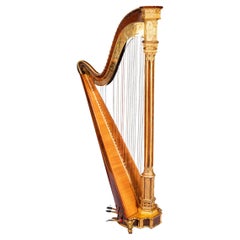Furniture
Late 19th Century English Gothic Antique Furniture
Metal, Iron, Wrought Iron
Early 20th Century English Gothic Furniture
Wood, Oak
1940s Spanish Gothic Vintage Furniture
Iron
Late 19th Century Belgian Gothic Revival Antique Furniture
Stained Glass, Oak
Mid-20th Century Spanish Gothic Revival Furniture
Metal, Iron
Early 19th Century English Gothic Revival Antique Furniture
Brass
16th Century French Gothic Antique Furniture
Wood
Early 1800s French Gothic Revival Antique Furniture
Wood
1870s British Gothic Revival Antique Furniture
Oak
20th Century Spanish Gothic Furniture
Iron, Wrought Iron
1960s Gothic Vintage Furniture
Stoneware
Late 19th Century French Gothic Revival Antique Furniture
Oak
19th Century Gothic Antique Furniture
Copper
15th Century and Earlier German Gothic Antique Furniture
Wood
19th Century Gothic Antique Furniture
Wood
Mid-19th Century French Gothic Antique Furniture
Wrought Iron
1850s American Gothic Antique Furniture
Pine
Late 19th Century French Gothic Revival Antique Furniture
Oak
17th Century French Gothic Antique Furniture
Iron
19th Century Gothic Revival Antique Furniture
Oak
19th Century French Gothic Revival Antique Furniture
Leather, Oak
1870s English Gothic Revival Antique Furniture
Oak
1870s English Gothic Revival Antique Furniture
Oak
1880s English Gothic Antique Furniture
Paper
Late 19th Century French Gothic Antique Furniture
Brass, Iron
19th Century French Gothic Revival Antique Furniture
Wood
20th Century Spanish Gothic Revival Furniture
Metal, Iron, Wrought Iron, Gold Leaf
Late 20th Century English Gothic Revival Furniture
Oak
Mid-20th Century French Gothic Revival Furniture
Bronze
Late 19th Century German Gothic Revival Antique Furniture
Berlin Iron
18th Century French Gothic Antique Furniture
Wood
Late 20th Century American Gothic Furniture
Metal
Early 18th Century European Gothic Antique Furniture
Iron, Wrought Iron
19th Century Gothic Revival Antique Furniture
Teak
19th Century Dutch Gothic Revival Antique Furniture
Mirror, Wood, Oak, Glass
Mid-19th Century English Gothic Revival Antique Furniture
Oak
Early 20th Century French Gothic Revival Furniture
Bronze
20th Century Belgian Gothic Furniture
Bronze
19th Century Belgian Gothic Revival Antique Furniture
Oak
Late 19th Century Belgian Gothic Revival Antique Furniture
Wood
1880s English Gothic Antique Furniture
Paper
Late 19th Century Belgian Gothic Revival Antique Furniture
Alabaster, Marble
1950s American Gothic Revival Vintage Furniture
Wrought Iron
19th Century European Gothic Revival Antique Furniture
Brass
1880s Austrian Gothic Revival Antique Furniture
Giltwood
Late 18th Century Spanish Gothic Antique Furniture
Brass, Copper
1880s English Gothic Antique Furniture
Paper
2010s American Gothic Furniture
Wrought Iron
Early 20th Century American Gothic Revival Furniture
Paper
16th Century German Gothic Antique Furniture
Iron
Mid-20th Century Spanish Gothic Furniture
Iron, Wrought Iron
Late 19th Century European Gothic Revival Antique Furniture
Other
1880s English Gothic Antique Furniture
Paper
20th Century German Gothic Furniture
Iron
17th Century French Gothic Antique Furniture
Wood, Oak
1890s Italian Gothic Revival Antique Furniture
Copper
1880s English Gothic Antique Furniture
Paper
Late 19th Century French Gothic Revival Antique Furniture
Brass, Bronze
1880s English Gothic Antique Furniture
Paper
Mid-20th Century French Gothic Revival Furniture
Oak
Shop Unique Furniture on 1stDibs
When it comes to shopping for vintage, new and antique furniture — whether you’re finally moving into that long-coveted loft apartment, ranch-style home, townhouse or furnishing your weekend house on the lake — you should think of your home as a stage for the seating, tables, lighting, storage cabinets and other pieces that best match your personality.
Coziness, comfort and creating a welcoming space are among the important things to consider when buying furniture, whether that means seeking strict cohesion or rooms characterized by a mix-and-match assembly of varying shapes, colors and materials. And for those who now work from home, exercise, eat and relax within the same four walls every day, they’ll also want to think about flexibility and an innovative approach.
Have you built your dream kitchen?
Is your current living-room furniture all that it could be?
Does your toast-worthy bar or vintage bar cart exude equal parts class and cheeriness?
And importantly, is your home office — backyard or otherwise — a happy one, regardless of the design style you happen to gravitate toward?
Although mid-century modern, rustic, minimalist, Art Deco and contemporary looks remain popular, they aren’t the only styles available to design connoisseurs.
Furniture styles are nothing if not fluid, meaning what’s popular one year may not be the next. That’s why it’s crucial to not only pay attention to interior-design trends but also focus on the styles that speak to you. That way, you (and your interior designer, if that is in the plans) can work to create a home that’s entirely your own, complete with impressively modern decor as well as an array of history’s universally renowned iconic designs.
It’s difficult to single out well-recognized designs from what is a crowded pantheon of celebrated and seminal furnishings. Certain outstanding designs have such stellar quality they’ve endured for decades as bona fide cultural treasures, still being manufactured, in many cases, by the same venerable companies that shepherded them into being (think Herman Miller, Knoll and Fritz Hansen). Some works come immediately to mind as contenders for any short list. When you’re discussing the most popular mid-century modern chairs, for example, no tally would be complete without citing designs by Arne Jacobsen, Charlotte Perriand, Charles and Ray Eames and Hans Wegner.
Good furniture, be it authentic vintage furniture or new & custom furniture, allows you to comfortably sit and tell your favorite stories. Great furniture tells a story of its own.
On 1stDibs, find everything from sofas to serveware to credenzas to coffee tables, and every other type of antique, vintage and new furniture you need to create a singular space that you’ll be proud to call home.
